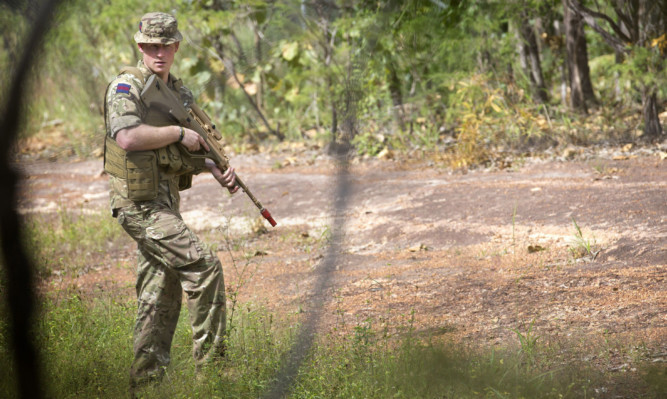
A top military chief has warned national security is in “grave danger” after armed forces recruitment plunged to its lowest level in half-a-century.
Ex-Army Colonel Sir Richard Kemp, who led our forces in Afghanistan, warned Britain is at threat because of its severely weakened fighting forces.
Shocking figures unearthed by The Sunday Post reveal the number of men and women joining the military plunged to its lowest level since 1964 last year.
Just 11,880 people were recruited into all three forces in 2013/14, compared to 41,820 in 1963/64.
Col Kemp said recruitment has now fallen to such a low level, Britain as a fighting force will struggle to meet its commitments.
His comments come only days after it emerged military chiefs had drawn up an extensive list of potential jobs for Prince Harry in an effort to persuade him not to quit the army.
Sources said they desperately wanted to find a role that would keep Harry in the military as “he is the best recruitment tool” it could wish for.
Col Kemp said: “The falling recruitment figures reflect the progressive reduction in the size of the armed forces. We have cut far too much and this puts our national security in grave danger.
“When you look at developments in the Middle East with Islamic State (ISIS) and what is happening with Russia in Ukraine, we need a stronger capability than many thought we did. We are very limited on land, sea and in the air and will struggle to fight future wars.”
He said the relative weakness of the armed forces had been a major factor in the rapid spread of ISIS in Syria. Meanwhile ISIS success in recruiting from Britain and the west has spawned a generation of terrorists who will eventually head back to our shores, he said.
“ISIS has been allowed to flourish. They recruit people from this country who get trained, blooded and motivated to come home and kill us. It is a threat which needs to be dealt with by military action.”
Recruitment figures were provided by the Ministry of Defence under Freedom of Information laws. They show recruitment into the Army, Navy and Air Force saw a peak in the lead-up to the 1982 Falkland’s war.
More than 50,400 troops had been recruited in each of the previous two years before the conflict, but at the start of the first Gulf War in 1990, the figure had dropped to 36,412 and fell to 22,969 at the beginning of the Afghanistan war in 2001.
Although hostilities in Afghanistan have ended, Britain still faces world-wide threats.
With a diplomatic row over the Falklands worsening, the Government has pledged to invest £180 million in the islands’ defences over 10 years.
Britain is also being stretched by forays by the Russian military into UK air and sea space.
The dramatic reduction comes as the Army cuts the size of its trained-strength force from 101,210 in 2012 to 82,000 regular personnel and 30,000 reservists by 2018.
The Royal Navy, Royal Marines and RAF are each losing 5,000 servicemen and women.
Last month Margaret Hodge MP, chairwoman of the Public Accounts Committee, voiced concerns over recruitment.
The performance of Capita, the private company paid £50 million a year to recruit troops had been “underwhelming”, she said.
The company only hit 66% of its recruitment target for regular soldiers.
A spokeswoman said “early indications” showed it would exceed that figure by the end of the year.
She said: “Capita is working with the Army to overcome initial setbacks, which prevented the recruiting partnership from reaching its full capability.
“This year the partnership will continue to transform the way the Army recruits, and remove any barriers which may be stopping quality candidates from applying.”
The MoD refused to comment.

Enjoy the convenience of having The Sunday Post delivered as a digital ePaper straight to your smartphone, tablet or computer.
Subscribe for only £5.49 a month and enjoy all the benefits of the printed paper as a digital replica.
Subscribe